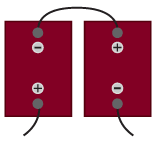There are a few more things that matter in your purchase and also a few things that matter less. One thing that matters is that you want to buy deep cycle batteries and avoid starting batteries. All of the golf cart batteries are deep cycle since they are designed to be charged overnight then run down driving the golf cart around in the day. But 12 volt Group 24 batteries come in both starting and deep cycle batteries. Starting batteries have a lot of thin plates in them. That works great at delivering a big power surge at once like you need to turn a starter motor. But all those thin plates are terrible at standing up to the rigors of deep discharge and charge cycles. You might see so-called starting/deep cycle marine batteries. They claim to do both well but really are a compromise. They won't start as well as a dedicated starting battery and won't deep cycle as well as a dedicated deep cycle battery.
Brand names don't matter much either. Those in the battery industry joke that there is only one battery plant in the world somewhere in China that produces some batteries that get marked as Interstate, some as Sears Die Hard, and some as Exide. Like most jokes, this is an exaggeration, but like most jokes, it has a grain of truth to it. There are few battery manufacturers and some less common brands like Deka are actually made by big companies. I tend to think about name brands as more tied marketing and less an indicator of real differences.
Also in the category of mostly marketing are designations like marine grade. Marine grade might get you a different color case or handy lifting ropes on the ends of the battery, but inside they're still the same lead plates in wet acid, gel, or AGM configurations.
You will mainly want to pay attention to Amp hour ratings for the money. When you compare Amp hour ratings, you need to make sure that you're comparing apples to apples. Amp hour ratings are different depending on the length of time you are drawing down a battery. Batteries store then give off power through chemical reactions. It takes time for those reactions to take place and the longer time you can give a battery, the more chemical reaction takes place. For example, a common Trojan T-105 (GC-2 sized) battery has the following amp hour ratings for different times:
5 hour rating - 185 Amp hours
10 hour rating - 207 Amp hours
20 hour rating - 225 Amp hours
100 hour rating - 250 Amp hours
That's all from the same battery. Ideally, you want to use the hour rating that matches how you use the battery. If you run the batteries down overnight then charge them every day, a 5 or 10 hour rating makes sense. If you run them down over a weekend trip then trickle charge them between trips, a 20 hour rating is most relevant. If you gradually discharge over a 4 or 5 day trip, the 100 hour rating is the best indicator to compare batteries. But which rating you use is less important than that you use the same rating for all of the batteries you are comparing.
You might be wondering why you can buy a 6 volt golf cart battery that has 225 Amp hours but if you buy two of them you still have 225 Amp hours. The reason is that a single 6 volt golf cart battery does indeed have 225 Amp hours, but at 6 volts. Since most of us need 12 volts, we have to combine two of them in series to give 12 volts. The two 6 volt golf cart batteries in series gives you 225 Amp hours at 12 volts.
Another long post. Sorry about that. I will try to wrap this up in one more post later today.


 We are looking to replace the house batteries on our Houseboat this year. Any thoughts/preferences on a brand of deep cycle batteries? Also, do you feel that the marine grade is worth the additional costs?
We are looking to replace the house batteries on our Houseboat this year. Any thoughts/preferences on a brand of deep cycle batteries? Also, do you feel that the marine grade is worth the additional costs?

